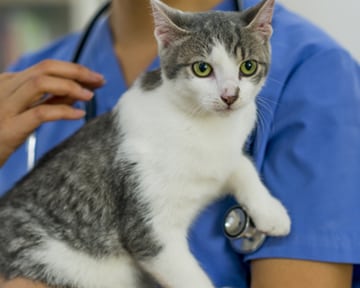Healthy Pet Care Tips in Fort Mill
Whether you’re a first-time pet owner, or you’ve had a pet for years, questions will likely arise about your pet’s health. Are vaccines really important? Does my indoor cat still need annual wellness exams? What exactly is heartworm disease? The list goes on and on. Part of our goal at Palmetto Pet Hospital is to educate our clients on the topics related to the health of their dog and cat companions. That’s why we’ve created the following list of frequently asked questions:
Are Dog and Cat Vaccines Really THAT Important?
The short and simple answer is YES! Vaccines provide protection from viral diseases like rabies, parvovirus, kennel cough (Bordetella), and feline herpes. Periodic boosters are important to keep your pet’s immunity strong.
My Pet Doesn’t Go Outside. Do They Still Need Parasite Prevention?
Yes. Mosquitoes (linked to heartworm disease) can easily make their way through open windows and screens, while fleas (linked to allergy dermatitis) can hitch a ride inside on the soles of your shoes. This is why we recommend that you keep your outdoor and indoor pets on a year-round parasite preventive.
My Cat Seems to Be in Good Health. Do I Still Need to Bring Them to the Vet?
Yes. As a defense mechanism, cats are known to hide their illnesses. Therefore, a cat that appears healthy on the outside may not be healthy on the inside. That’s why we recommend annual wellness exams to look for hidden signs of illness.


What Exactly Is Heartworm Infection?
Heartworm infection is a condition in which adult worms live in the heart and associated blood vessels of a pet, predisposing them to heart failure or sudden collapse and death. The adult worms mate and produce microfilariae (babies) which are released into the bloodstream. When a mosquito bites an infected pet (taking blood meal from it), and then bites another pet, the microfilariae migrate from the skin bite to the bloodstream to the heart of the second pet, where they grow to maturity in the host’s heart to start the cycle anew.
